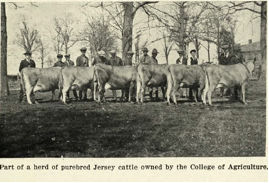FAYETTEVILLE, Ark. – University Libraries has digitized over 34,000 pages of content for its latest digital collection, the Arkansas Extension Circulars. An award from Project CERES, whose name honors the ancient goddess of agriculture and also evokes the term ‘series,’ provided funding for the project.
The Arkansas Agricultural Extension Service began publishing the Arkansas Extension Circulars in the 1880s. These popular publications covered myriad agriculture-related topics: sewing, gardening and caring for livestock among them. Now, users worldwide can access these guides online.
“One great thing about the Arkansas Extension Circulars is that there are modern-day applications for these publications,” said primary investigator Necia Parker-Gibson. “For example, aspiring gardeners who want to avoid using current herbicides and pesticides can look to the circulars for best practices on doing just that.”
The Circulars are the first in a three-part digitization series. Currently, the Libraries’ Digital Services Unit is working on digitizing the Arkansas Agricultural Experiment Station Bulletin. Rather than serving as how-to guides, the Bulletin shows the results of research experiments in agriculture. For example, the best practices for peanut cultivation – a crop of critical importance during the World Wars – or the results of interplanting cowpeas with corn can be found in the Bulletin. An award from Project CERES funded this project, as well.
The Libraries’ third and most recent Project CERES award will fund the digitization of Arkansas Extension Miscellaneous Publications, the third collection of the Arkansas Extension digitization series. These miscellaneous publications include documents such as insect identification guides, surveys of house plans considered appropriate for Arkansas, and documents related to social services, nutrition, gardening and animal care.
“These documents can be used to take a look at historical research, and they also have sociological implications,” said Martha Parker, chief organizer of digitization.
Once digitization is complete, each collection will be provided to the Center for Research Libraries. These collections are organic, meaning new material is made available on the Libraries’ website as soon as it is digitized.
“We are grateful to Project CERES for funding these collections, which will be able to serve many more people now that they are being digitized and made available online,” said Carolyn Henderson Allen, dean of University Libraries.
About University of Arkansas Libraries: Located at the heart of campus, David W. Mullins Library is the university’s main research library. Branch libraries include the Robert A. and Vivian Young Law Library, the Fine Arts Library, the Physics Library, and the Chemistry and Biochemistry Library. The Libraries provide access to more than 2 million volumes and 53,000 journals, and also offer individual and group research help, study spaces, computer labs with printing and scanning, interlibrary loan and RazorRush services, and cultural exhibits and events. The Libraries’ Special Collections unit acquires, preserves, and provides access to materials on Arkansas and the region, its customs and people, and its cultural, physical, and political climate. Visit the Libraries’ web page at libraries.uark.edu to learn more about services and collections.
About the University of Arkansas: The University of Arkansas provides an internationally competitive education for undergraduate and graduate students in more than 200 academic programs. The university contributes new knowledge, economic development, basic and applied research, and creative activity while also providing service to academic and professional disciplines. The Carnegie Foundation classifies the University of Arkansas among only 2 percent of universities in America that have the highest level of research activity. U.S. News & World Report ranks the University of Arkansas among its top American public research universities. Founded in 1871, the University of Arkansas comprises 10 colleges and schools and maintains a low student-to-faculty ratio that promotes personal attention and close mentoring.
Contacts
Kelsey Lovewell Lippard, Public Relations Coordinator
University Libraries
479-575-7311, klovewell@uark.edu
Necia Parker-Gibson, Research and Instruction Services
Collection Dept, University Libraries
479-575-8421, neciap@uark.edu
